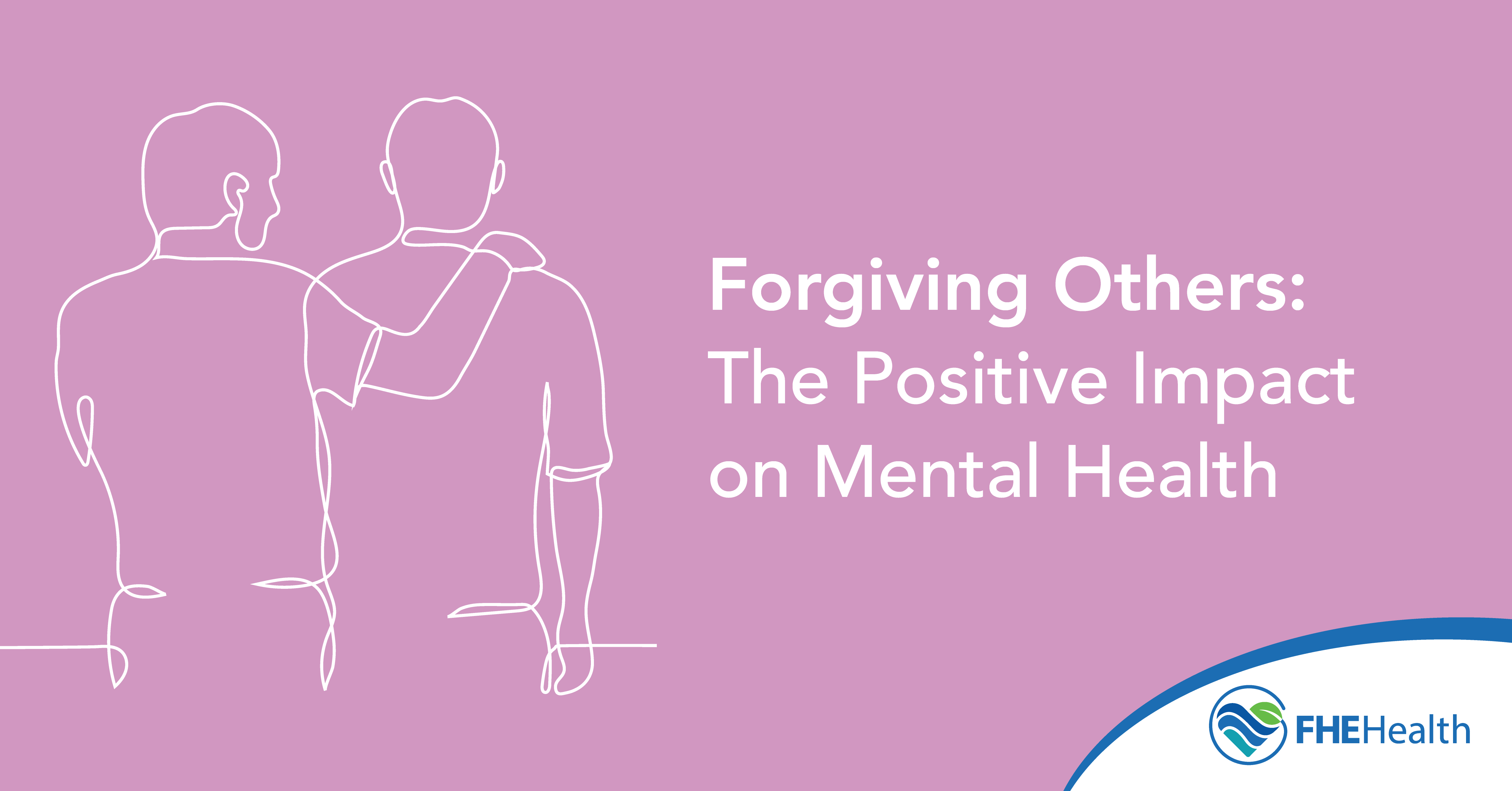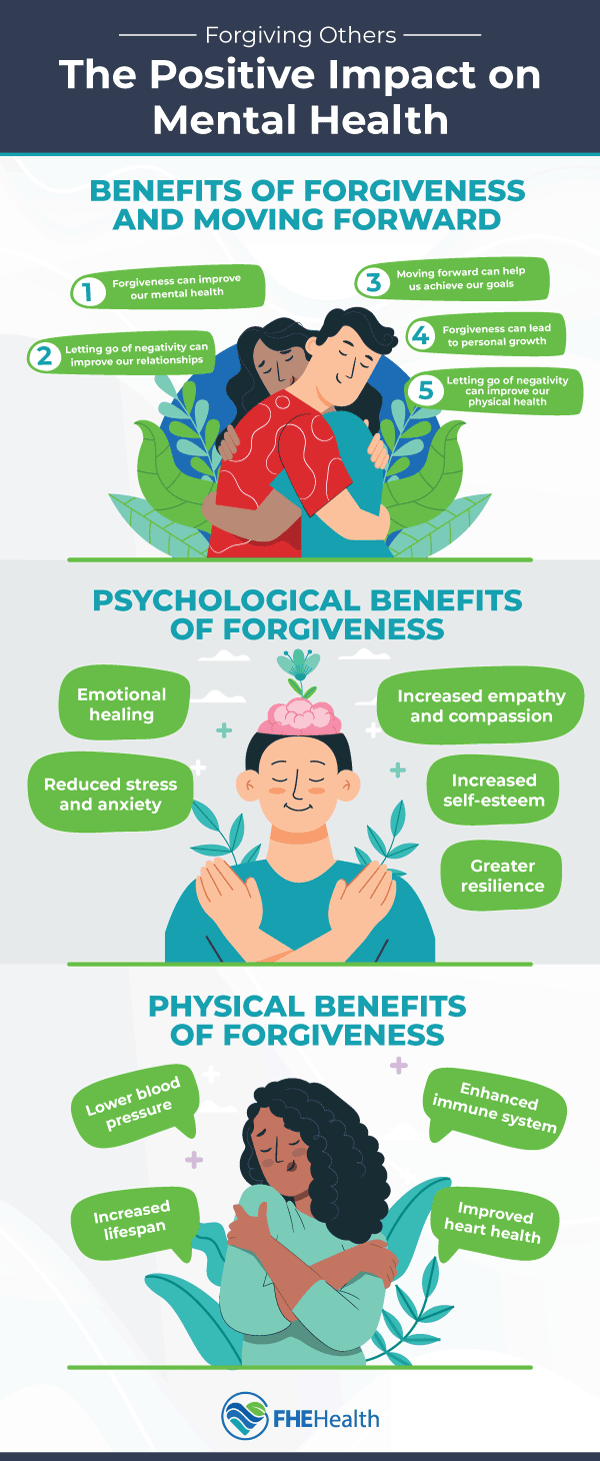
Conflict happens. Unresolved conflict, however, can wreak havoc on health and relationships. Holding onto hurt feelings can increase stress, higher levels of which can adversely impact mental, emotional, and physical wellness. Elevated blood pressure, headaches, stomach upset, an impaired immune system, and sleep disruptions are just some of the physical symptoms you might face if you hold onto a grudge. Beyond that, you might experience anxiety, negative self-esteem, or a breakdown of the relationship.
The Science of Forgiveness
People who hold onto their negative feelings can be more prone to depression, post-traumatic stress disorder, and other health conditions. However, the science of forgiveness doesn’t lie. Letting others off the hook is known to reduce these risks, along with stress, anger, and resentment.
Some people are naturally more forgiving. Many find it difficult to let go of anger or resentment. However, one survey revealed that 62 percent of Americans believe they need more forgiveness in their lives. Fortunately, forgiveness is a skill that you can practice and develop to bring more peace and contentment into your life.
How Forgiveness Reduces Stress and Anger
Holding onto a grudge isn’t healthy. The anger you experience can feed a chronic state of stress, releasing cortisol into your body. This stress hormone is what activates the fight-or-flight response and the sympathetic nervous system. Forgiveness, on the other hand, activates the body’s parasympathetic nervous system, associated with rest and calm.
Studies on forgiveness recognize its ability to improve overall mental wellness. One such study found associations between forgiveness and mental health symptoms. More specifically, higher rates of forgiveness can be linked to lower levels of mental health symptoms and perceived stress levels. A theory behind this is that forgiveness allows individuals to cope with their perceived levels of stress that can negatively impact mental health. Likewise, a decrease in mental health symptoms further reduce perceived levels of stress.
The Link Between Forgiveness and Emotional Healing
Forgiveness can be difficult, especially when the transgression is particularly hurtful or harmful. However, given the research into its health benefits, forgiveness can be understood as an act of self-care. It can also be a form of self-empowerment — to move forward rather than get stuck in negative emotions.
Forgiving others gives you room to recognize your emotions and how a certain event or person has made you feel. This in turn allows you to make a choice about how to move forward to a place of acceptance, where you can acknowledge what has happened without letting it harm your emotions or mental health.
Practical Steps to Forgive and Move Forward
No matter who wronged you or how it happened, you have a choice to make. You can choose to wallow in the bitterness, anger, and resentment. Or, you can release those negative feelings and move forward through a door of forgiveness and release.
Learning to forgive takes time and effort, but it’s often well worth it. Consider these steps and remember to have compassion for yourself as you work through your complex feelings.
1. Recognize Forgiveness for What it Is and Isn’t
Forgiveness helps you move forward from the hurt or betrayal you may have experienced. Learning to forgive isn’t the same thing as forgetting what happened. It also isn’t:
- Excusing, condoning, or justifying wrong or hurtful behaviors.
- Conditional based on the transgressor’s actions moving forward.
- Changing the other person or their behaviors.
- The same as trusting the other person moving forward.
- The same as reconciling with the other person.
Rather, forgiveness is an active, conscious decision to release negative feelings you may harbor against someone who wronged you. You make the decision to move forward without letting your resentment or anger control you.
2. Reflect and Acknowledge What Happened
What happened that you need to forgive? Take some time to reflect upon it. Recognize that you didn’t deserve to be betrayed, wronged, or harmed by the other person. Their actions do not define you or your value as a human being.
Depending on what you’re struggling to forgive, therapy can be a useful tool at this stage. It can help you process what you have experienced and learn healthy ways to cope. For example, if your spouse had an affair, therapy can help you acknowledge that it wasn’t your fault that they chose to step out on the marriage. If you’re harboring resentment against a parent for childhood abuse or neglect, you may learn to acknowledge that you didn’t deserve to be treated that way.
This step is crucial to forgiveness because, until you’ve given yourself the grace and space to process your negative emotions, you can’t truly let them go.
3. Empathize
It might seem counterintuitive to empathize with someone who has wronged you, but it can be helpful in letting go of negative emotions, especially if you want to repair the relationship with the other person. The person you want to forgive has wronged you in some way. However, they’re also human and are imperfect by nature, just as everyone is. For example, perhaps a friend of yours made a comment that you found hurtful. Acknowledging them as a flawed human just like you allows you to feel compassion for them. Maybe you recognize they had a bad day when they made the comment and they said something that they didn’t mean. It can be easier to forgive and repair relationships from a place of empathy and compassion.
4. Let Go of Expectations
Forgiveness is given freely and without expectations moving forward. You may or may not choose to reconcile with the other party. If you choose not to, you might need to acknowledge that they will never change their behavior — but you can by ending the relationship or setting strict boundaries.
5. Make the Conscious Decision to Forgive
Finally, make the conscious decision to forgive. It might feel difficult at first, but with practice, it becomes reflexive. When the negative feelings come up, don’t let them sway you into wishing for revenge or resentment. You may need to remind yourself frequently that you’ve chosen to move forward in forgiveness. Remember, you’re letting go of the resentment. If it helps, think of it as no longer wasting your valuable time, energy, and headspace on something in the past.
Tips for Forgiveness and Letting Go of Resentment
Try implementing some of these strategies to hold onto your commitment to forgiveness:
- Reflect through journaling to let your negative emotions out. If it helps, burn or destroy the paper when you’re done as a symbolic gesture of letting go of the negativity on it.
- If you’re religious, consider prayer for further reflection. Mindfulness meditation can also help you stay grounded and focused on the present rather than past hurts.
- Create firm, healthy boundaries surrounding how you were hurt to protect yourself moving forward. For example, if someone called you a hurtful name, make it clear that you will not tolerate such behavior moving forward.
- Share your thoughts and feelings with loved ones carefully. While it’s natural to turn to your support network when you need it, recognize that sometimes, your friends and family members can add more fuel to the fire by getting angry for you and amplifying your emotions. If you want to share, let them know about your journey to forgiveness and ask them to listen without commenting.
Building Healthier Relationships Through Forgiveness
Conflicts are bound to arise in your relationships from time to time. No one is perfect and everyone makes mistakes. However, without forgiveness, resentment can take hold and damage, or even destroy, your bond. Forgiveness acts as a positive foundation that helps resolve those conflicts in a positive, healthy manner so the relationship can move forward.
Learning to be more forgiving can be difficult, but it’s also something that you can improve with time. In doing so, you can enjoy healthier relationships, better mental health, and a more positive outlook on life. The compassionate team at FHE Health can help you work through pain, anxiety, or other mental health symptoms that may be holding you back from a happier and healthier life. Contact us today to get started.







